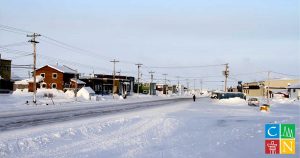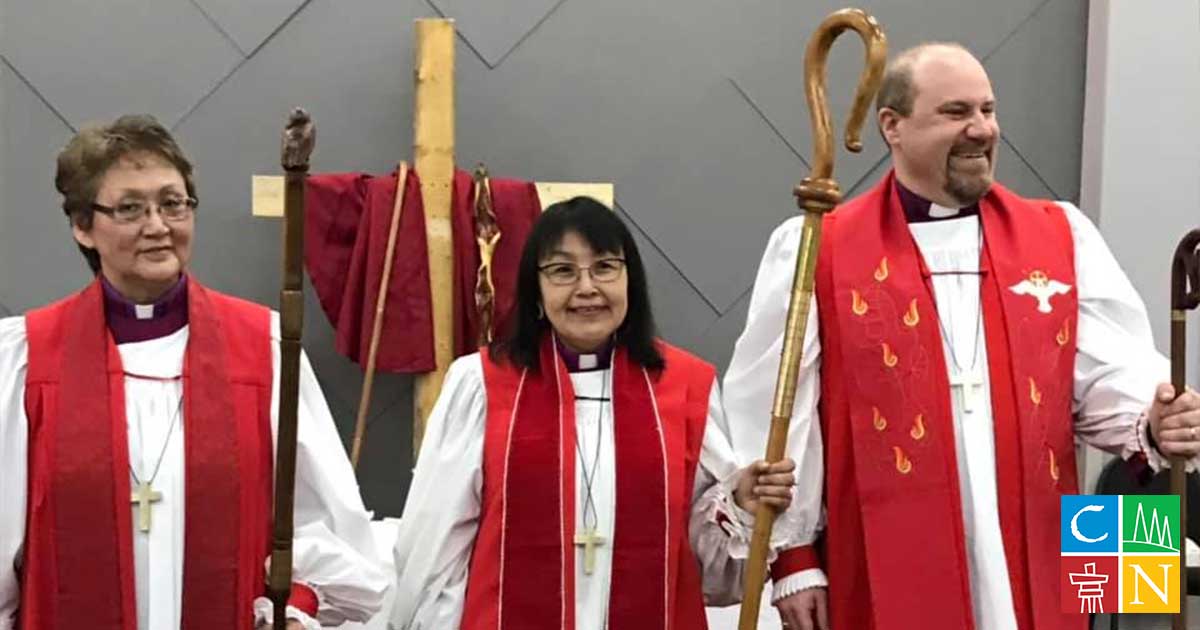from the Advent 2020 edition of Contact
A conversation with Bishop Lucy Netser of the diocese of the Arctic
By Matt Gardner for Contact
Lucy Netser was elected as a suffragan bishop for the Arctic on March 28, 2019, and consecrated on March 31. Before becoming a priest, Netser spent three decades as an active participant in the Woman’s Auxiliary/Anglican Church Women of Canada. She currently lives in Arviat, Nunavut, where she serves as lead pastor at St. Francis’ Church in addition to her duties as bishop and as regional dean for the Kivalliq deanery.
Contact spoke with Bishop Netser on Oct. 14, 2020 to learn about recent developments and ongoing concerns in the diocese of the Arctic. This interview has been edited for brevity.
Q. How has your episcopal ministry been going since your consecration?
A. Busy, because I also look after a parish. So I’ve been much busier now, meeting with bishops across Canada and our diocese’s bishops.
Q. How are you balancing your work as a bishop and your work as a pastor?
A. I have good helpers. If I have to go somewhere, then I just get someone to replace me.

Q. What are your current priorities as bishop?
A. My priority is for everyone to have Christ. I want everyone to get to know God and have him as a personal saviour. I like to get all the parishes all the information that they need to know, because some of them are unilingual in Inuktitut.
Sometimes I have to explain in Inuktitut to some unilingual people that are leading in the communities, or if someone is not too sure about something, then I tell them in Inuktitut. I like all the people that didn’t really know what to do to find out what their responsibilities are and what their requirements are. These are my priorities.
Q. Are there any efforts to develop more resources in Inuktitut or hire additional clergy who speak the language?
A. I wish that was possible. There are so many people that don’t want to be priests because they don’t want to be away from family, and some of them have kids and kids don’t want to go, you know, these things.
I would like to see lots of priests everywhere. There’s a lot of work, but not enough workers.
Q. What kind of impact has COVID-19 on ministry in your part of the diocese?
A. The first three months [of the pandemic], March, April, May, we couldn’t really do anything at all—no church and no church services. All the events that were going on in the church were cancelled. We couldn’t do that anymore.
The only thing that we could really do was to go on the local radio. They have it open for the leaders in the church to go on the radio and hold services that we have for churches here in Arviat, where I am. These four churches, they’re welcome to be at the radio station. So we were at the radio stations, all four of us, on Sundays or during the week.
We also would hold prayers through CB [radio] … and livestream services on Facebook. I’ve learned how to use livestream; I didn’t have a clue before that. I will be alone or have someone sitting quite far from me in the church and I would do the services, at least once every Sunday, if I didn’t go on the radio.
There are a lot of people using Internet. But the majority of people in town here are Inuktitut-speaking. Even if they had Internet, they can’t understand what is being said or how to go on a livestream if you don’t have a Facebook account or Messenger, that sort of stuff. A lot of people don’t have Internet.
Q. Are you doing in-person worship anywhere now?
A. We’re doing services now. We just were able to go in the church for Nunavut. At first, for Nunavut, we were doing services with masks on, and it was quite difficult for some people who had breathing problems or people that can’t really have their faces covered.
But right now, as of last Sunday, we now can have services without a mask on. We can sing now. But the limit is 75% of the capacity of the church. So there have been people going to church. Kids weren’t allowed to go to church [as of] the 10th of March. Now kids just started going there when the mask [requirement] was lifted.
Q. Anything else you’d like Anglicans to know about what’s going on in the diocese?
A. The diocese of the Arctic is a vast land. From way up there down [south], the only transportation we can use is the airplane, and it’s very costly.
Some people don’t understand why there are three suffragan [bishops] besides Bishop David [Parsons]. We need to have those in order to keep in touch and in order to travel. For Nunavut, we can travel. But we can’t travel outside of Nunavut, even to the churches…
Sometimes it’s mentioned that we have way too many bishops. But a lot of us are so far away, we can’t even see each other unless we have a meeting somewhere sometime, like for executive once a year. That was before; it doesn’t happen anymore because we’re all in different locations. Our boss is in Yellowknife … [Bishop] Joey [Royal] is in Iqaluit … [Bishop] Annie [Ittoshat] is down in Quebec, and I’m way down here pretty close to Churchill. The only connection we have is the telephone or internet. We try and update each other as much as possible.
Interested in keeping up-to-date on news, opinion, events and resources from the Anglican Church of Canada? Sign up for our email alerts .

